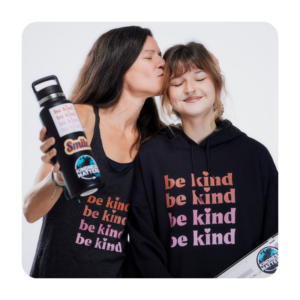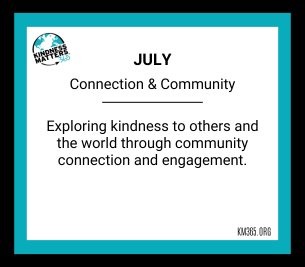FOUNDER FEELS: Life Lessons with Laura
We’ve all experienced or heard heart-wrenching stories of pandemic fallout and my heart is with the children who are faced with learning how to navigate our world in these challenging times. People often ask me how to recognize the signs when our kids are struggling, how we can best support them and prevent bullying and suicide. From my heart and my own experiences, here are some tips that have served me along my way.
Be Mindful When Your Kids’ Behaviors Change
With my kids and their friends, other children in our extended family, and with my friends’ kids, I’ve seen stress manifest itself through changes in behavior. For example, kids seem more irritable or moody; they withdraw from activities they used to enjoy. They expressed more worries than usual, complained more about school, and often said they felt “sick” with stomach and headaches. I saw crying, excessive clinginess, sleeping/eating too much or too little with young kids. A close friend confided that their teenaged child expressed feelings of stress by speaking of themselves, others, and the world negatively. I saw teens with immense anxiety avoiding their parents, abandoning long-term friendships for a new set of peers, and expressing excessive hostility toward family members. We want to pay attention to these signs and dig a little deeper to see if some support or intervention is needed.
Say Something, Do Something, Be Available
When it comes to our kids, it’s essential to address things timely when we are concerned. When we are tired and dealing with our stress, inviting a “heavy” conversation might not be easy…but I have found that it is received well when I address things from a place of love. “I love you and noticed you seem a bit blue lately….I was hoping we could go out for _______ one day this weekend for some special bonding time.” It will work a lot better than “You never tell me anything these days!” Be authentic and honest with your kids, respect their feelings and thoughts, and try to be available when THEY want to talk. Also, each child is different – but I’ve noticed that teens cherish their right to privacy. Pushing them to share their feelings will most likely be met with resistance. Never waste a car ride or a simple task like folding laundry together. Simply sharing the same space can create the opportunity for interaction. I’ve realized the most crucial part of staying available is a state of mind – our kids sense our emotional availability.

Truth Bomb: Kids Want to Share and Be Heard
Believe it or not, sometimes, kids are looking for input and advice. Other times, they want to get something out or have someone listen to them. Something that has helped the flow of conversation when my children come to talk with me is to ask them, “do you want me to listen right now, or do you want advice and support?” It gives my child an opportunity to help me parent them better, and, in the answer, they can receive what they need at that moment. Of course, it varies by the individual and age, and sometimes I give feedback even when asked to listen (I am a MOTHER still). This approach helps kids work out their feelings and validate they had someone there to listen. It gives them the space and encouragement to engage and truly process what is going on for THEM. It reinforces that their feelings, thoughts, and opinions matter—game changer.
Let Self-Awareness & Self-Navigation Be Your Guide
These are staples in our home and skills that have made a big difference in how our kids figure things out and relate to each other. When children understand what is happening inside themselves and have the right tools to process what’s happening, they can powerfully respond to whatever is in front of them; they are empowered and strong. So, we created vocabulary and actions around self-awareness, such as journaling or talking things out with a trusted friend or family member. And we worked through self-navigation tactics, such as focusing on the breath, listening to their favorite playlist, smelling specific scents, taking in nature, going for a walk. So many options! We just made it a way of life, and this “way of being” positively impacted how our kids approached decisions, big and small. They were better able to get through things independently, and I believe it will be a part of their lifelong success in coping.
Focus On Your Kids’ Mental Health FIRST
I don’t know about you, but so many things I deemed essential to focus on as a parent have completely gone out the window. My current commitment is to do my part in supporting my children’s and all children’s mental wellness first. With my mental health struggles these past few years, I understand more than ever that our children need our empathy and compassion BIG TIME. Times are challenging for all of us. Slow down and breathe; life is precious. Together, we will get through these difficult times.
Lose the Kid Gloves & Embrace the Discomfort
No sugar coating, shutting down or dismissing their uncomfortable feelings and emotions. Our kids are struggling during these times of flux and uncertainty. We want to re-think telling them to “toughen up” or “stop with the negative feelings.” Listen to them, hear their concerns, and provide what you can to support their journey through it. Sometimes the most powerful gift we can give is listening and letting them feel their feelings. You do not have to fix everything or suffer through it, but rather love them through it. As the old saying goes, “it’s not important how many times you fall, but how many times you rise.” Falling and picking ourselves back up is part of our human experience and an opportunity for growth.
Real Talk: Therapy ROCKS
It’s not only okay to ask for and get help, but it can also be life-saving for many. Honestly, I don’t know what I would do without my weekly mental health check-ins and support. While it can be challenging to find or afford services in this area of therapy, there are a variety of excellent, caring practitioners and resources out there. Our communities abound with therapists, trusted adults, school counselors, clergy, sliding fee-scale therapists (like the Faulk Center in Boca Raton), and alternative providers. This type of support has made a difference for me, my family, and many others I know. Sometimes the word “therapy” or “therapist” can be a trigger for kids. Perhaps referring to them as a “coach” or “guide” could be helpful.
I hope some of these tips are as helpful for you as they were for me. Always remember, you’ve got this! WE’VE got this! We are all united and in this together and I wish everyone a beautiful 2022!
With Love; In Kindness,
Laura W. Reiss | Founder/Chief Kindness Officer


